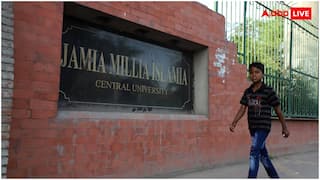Bengaluru Prison Radicalisation Case: NIA Conducts Raids In 17 Locations Across 7 States
The investigating agency is conducting searches in 17 locations across seven states.

The National Investigation Agency is conducting searches in seven states as part of the Bengaluru Prison Radicalisation investigation on Tuesday, news agency ANI reported. The investigating agency is conducting searches in 17 locations across seven states.
National Investigation Agency is conducting searches across seven states in the Bengaluru Prison Radicalisation case.
— ANI (@ANI) March 5, 2024
In July of last year, Bengaluru police's Central Crime Branch (CCB) detained five men suspected of being radicalised by LeT inmate T Nasser inside the city's Parappana Agrahara Central Prison.
ALSO READ | PM Modi In Telangana And Odisha Today, Will Launch Multiple Projects Worth Over Rs 24,000 Cr
Bengaluru Prison Radicalisation Case
A new terrorism case sprouted up from the Bengaluru prisons in July 2023, after central agencies pointed out that how prisons, where prisoners in connection with terrorism cases were lodged, was being used to radicalise new set of criminals to take up arms in the name of religion.
The case was transferred to the NIA, which conducted the raids at six locations, including the homes of Mohammad Umar Khan, Tanveer Ahmed, Mohammad Faisal Rabbani, and Mohammad Farooq.
During the raid, NIA investigators recovered digital devices, "incriminating" papers, and Rs 7.3 lakh in cash. During the July 2023 searches, the CCB confiscated seven country-made handguns, 45 rounds, four walkie-talkie sets, a knife, and 12 mobile phones.
Junaid and 12 others were detained in 2017 in connection with a murder case filed at the RT Nagar Police Station. Nasser reportedly radicalised Junaid and five others while they were in prison.
Following their release from jail, the six men "plotted" bomb attacks in Bengaluru at Nasser's request, according to the NIA. Junaid has been missing since 2021, after being implicated in a red sanders smuggling case.
Investigators believed that he spoke with the accused individuals via encrypted communication channels and gave them with funding for rifles and ammunition.
Related Video
Uttarakhand's famous shrine Badrinath Dham reopens for pilgrims today | Abp news







































